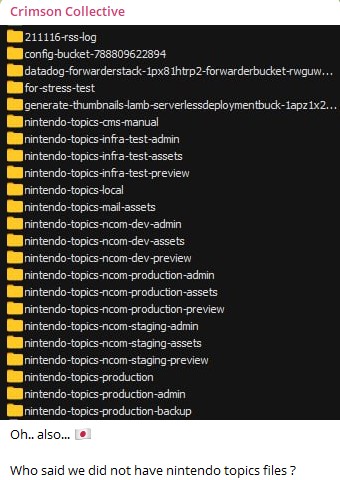
This time, hackers are targeting Nintendo , the historic Japanese video game company that has been tooth and nail for decades defending its intellectual property and the industrial secrets that fuel the Mario, Zelda, and Pokémon universes. The Crimson Collective group, already known for having previously hacked the network of open source software giant Red Hat , has claimed to have compromised Nintendo’s internal servers, gaining access to the company’s confidential files and data.
Cybersecurity intelligence firm Hackmanac shared a screenshot on X that allegedly shows internal Nintendo folders containing data such as production assets, developer files, and backups. However, no specific files or sensitive data have been released publicly to date, making it impossible to verify the full extent of the incident. Nintendo, for its part, has not yet released any official comment, maintaining the strictest confidentiality on the matter, an understandable choice given the sensitive nature of the brand and its long history of legal action against hackers and pirates.

At this time, the available information remains purely speculative. It could be an attempt by the group to gain visibility, or a real breach that Nintendo is still trying to contain internally. Such a compromise would have significant consequences, considering the obsessive attention with which the company guards every detail related to its future projects and marketing strategies.
If the alleged attack were to prove authentic, the consequences for Nintendo could be severe on multiple fronts. In addition to the potential leakage of sensitive data, such as the source code of in-development games, concepts for future consoles, or internal documentation, the greatest damage would be to its reputation. Such a leak could expose confidential information, undoing years of work and marketing planning, as well as undermining the trust of commercial partners and third-party developers. Furthermore, any technical details about internal systems could provide a valuable roadmap for future attacks, further exposing the Japanese giant’s infrastructure. The risk of manipulation or misinformation should not be underestimated: the mere claim of responsibility by one group can generate a wave of viral news and speculation, often amplified by social media, with direct repercussions on the company’s image.
In recent years, several video game giants, including Sony, Capcom, and Insomniac Games , have been victims of targeted attacks that have resulted in the theft of source code, internal documentation, and unreleased material. A potential attack on Nintendo would therefore not be an isolated case, but rather another piece in the puzzle of an increasingly widespread threat: that of cybercriminals targeting the digital entertainment industry.
Until further confirmation emerges, the alleged attack remains a rumor, but it draws attention to the fragility of the systems even of industry giants and the need to carefully safeguard sensitive data and infrastructure.
Follow us on Google News to receive daily updates on cybersecurity. Contact us if you would like to report news, insights or content for publication.
